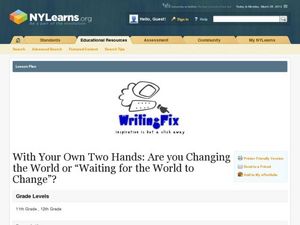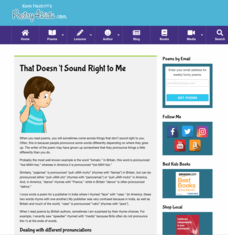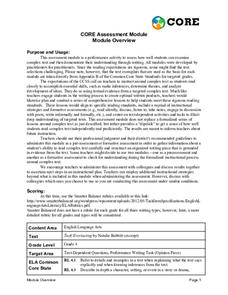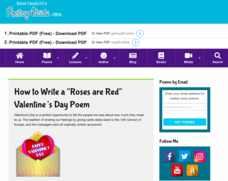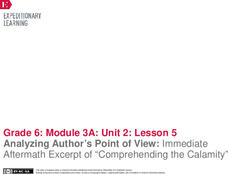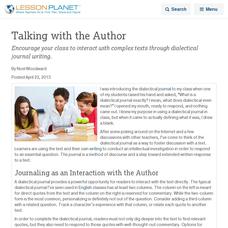Curated OER
With Your Own Two Hands: Are You Changing the World or "Waiting for the World to Change"?
Can your pupils change the world? Explore this question with Ben Harper's song "With My Own Two Hands" and John Mayer's "Waiting for the World to Change." After listening to the songs, they discuss the tools at their disposal for...
Curated OER
Left-to-Right Reading
Left-to-right, left-to-right, that's the way we read and write! Watch this short video clip and teach your young learners this chant before they start writing!
Curated OER
Paper Chain Connections
Make real connections in literature and in life. While reading, class members fill out links for a chain, circling the connection type, noting the page number, and commenting on each one. When they've completed all the links, they cut...
Curated OER
Letters to Poets
Add a strong poetry lesson to your literature unit. Middle and high schoolers investigate their writing voices with journaling and group discussion, then choose a famous poet to study. They write letters to their chosen poets, explaining...
Global Oneness Project
What Does it Mean to Be Resilient?
Imagine the determination it would take to build a helicopter out of scrap. Now imagine doing it while hindered by the effects of polio. Everything is Incredible, a short film by Tyler Bastian, introduces Agustin who has been...
Roy Rosenzweig Center for History and New Media
Immigration: Why Come to the United States?
Don't limit your curriculum to texts! Young historians listen to a song, read an interview, and examine a cartoon as they explore motivations for immigrating to the US in the late 19th and early 20th centuries.
Poetry4kids
How to Write a Traditional “Mother Goose” Nursery Rhyme
There may be some little lambs, itsy bitsy spiders, and pumpkin eaters in your language arts class! An online poetry lesson takes learners through the steps of writing a nursery rhyme with easy-to-follow steps and explanatory examples.
Poetry4kids
That Doesn’t Sound Right to Me
Does pajamas rhyme with llamas to you? If it does (and even if it doesn't), an online lesson on rewording poetry for regional pronunciation may be helpful for you and your students.
California Education Partners
Tuck Everlasting
An assessment takes a close look at the story, Tuck Everlasting by Natalie Babbitt, and tests writing abilities. Over the course of two days, scholars read an excerpt, answer questions on a learning exercise pertaining to the...
Poetry4kids
How to Write a “Roses are Red” Valentine’s Day Poem
Compose a Valentine's Day poem! Practicing their rhyming skills, scholars follow the traditional format to create a happy poem for a friend or family member.
Curated OER
Author Study: Jan Brett
After a unit on Jan Brett's books, this resource would be a great way to discuss what everyone has learned. Each of the slides in this presentation focuses on one of Brett's books. There are also links to quizzes and other supplementary...
Scholastic
Ask the Author
Here is a quick activity that could help your kids with their reading comprehension. They practice a classic strategy that gets them to start asking questions about what they are reading, while they are reading it. They write out...
Curated OER
Hermeneutics: Teaching Students Author's Purpose
Your developing literary critics discuss 'perspective' and discuss how the same occurence can be interpreted by two different people in two different ways. They read Ryszard Kapuscinski's untitled poem, infer meaning of the poem, and...
EngageNY
Comparing an Author’s Presentation of Ideas: “Rachel Carson: Sounding the Alarm on Pollution”
It's all in the presentation. Readers take a look at author's presentation in the article Rachel Carson: Sounding the Alarm on Pollution. Scholars work together to complete a Comparing
and Contrasting Authors’ Presentation graphic...
EngageNY
Analyzing Author’s Point of View: Immediate Aftermath Excerpt of “Comprehending the Calamity"
Analyze that! Scholars continue reading and analyzing a primary source about the immediate aftermath of the 1906 San Francisco fire and earthquake. Then, individuals use graphic organizers to identify the author's point of view.
Student Handouts
Why Does an Author Write?
To get to the heart of a writer's purpose, just remember to have some PIE (Persuade, Inform, or Entertain)! And appropriately, here is a PIE chart that leaves room for pupils to identify each letter of the acronym and any other...
DocsTeach
Analyzing a Letter to Congress About Bloody Sunday
The brutality of Bloody Sunday—when non-violent protesters who supported voting rights for African Americans were beaten by police—captured a nation. Young historians examine the letter of one horrified American to Congress to consider...
Curated OER
Artistic Interpretation of a Classic: The Author's Role
Reading the original Hans Christian Andersen tale of “The Little Mermaid” and viewing the Great Performances: The Little Mermaid from the San Francisco Ballet video offers class members an opportunity to consider how artistic decisions...
Curated OER
Talking with the Author
Encourage your class to interact with complex texts through dialectical journal writing.
Curated OER
Bring Read-to-Learn Activities into Your Classroom
Shift your instruction from teacher-centered to student-centered, which requires learners to do the heavy lifting.
Penguin Books
Teacher’s Guide: Of Mice and Men by John Steinbeck
A 10-page guide to John Steinbeck's Of Mice and Men includes a brief plot summary, information about preparing readers for the language in the novel, pre-reading, during reading, and post-reading questions, essay prompts, and project...
Academy of American Poets
Women in Poetry
Imagine linking poetry to technology! Thirty-three lessons comprise a 6-week "Women in Poetry" unit for high schoolers. Class members research women poets, learn how to respond electronically to discussions, write their poems, create web...
Core Knowledge Foundation
Unit 7: Poetry
Over the course of a 12-lesson language arts unit, young scholars analyze a variety of poems taking a close look at figurative language and tone. They learn to compare and contrast, improve comprehension, and identify settings. To...
Curated OER
Can Scientists Discover a Limit to Discovery?
Is there anything left to discover? Evaluate opposing sides of the debate regarding whether or not there is a future for scientific discovery. Middle and high schoolers assess quotations from the articles included to evaluate claims and...
Other popular searches
- Author's Purpose to Inform
- Authors Purpose to Entertain
- Georgia Authors to Study
- Critical Response to Authors
- Author's Purpose to Persuade
- Author Want to Convey
- Writing a Letter to an Author
- Authors Purpose to Inform
- Authors Purpose to Criticize
- Letter to Author
- Letter Writing to an Author
- Friendly Letter to Author


